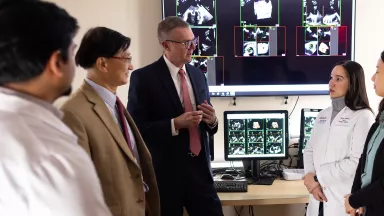Ventricular Tachycardia
At the Montefiore Einstein Center for Heart and Vascular Care, you can access exceptional care for ventricular tachycardia. As a global leader in cardiovascular medicine and surgery, we are an academic-based, national and international referral site for high-risk and complex cases. For more than a century, we have been at the forefront in treating heart disease.
Ranked in the top one percent of all hospitals in the nation for Cardiology, Heart & Vascular Surgery according to U.S. News & World Report, our specialists are passionate about uncovering the latest diagnostic approaches and treatments that can improve outcomes. Backed by a multidisciplinary team of specialists, Montefiore Einstein continues to make advances in the treatment of heart disease. In recent years, we have expanded our programs in advanced cardiac imaging, heart failure and interventional cardiovascular medicine and assembled a world-renowned cardiothoracic surgical team.
When you trust us with your care, you can expect compassionate, personalized treatment plans that meet the highest standards for quality and safety. In addition, we offer patients a full choice of support services, from nutritional guidance to rehabilitative therapies.
When you need care for ventricular tachycardia, turn to our dedicated providers who will develop a highly personalized treatment plan specific to you.
Montefiore Einstein offers the following content from Healthwise’s health information library.
What is ventricular tachycardia?
Ventricular tachycardia (VT) is a type of fast heart rhythm that starts in the lower part of the heart (ventricles). The heart beats more than 100 beats per minute.
Some forms of VT may get worse and lead to ventricular fibrillation, which can be life-threatening. With ventricular fibrillation, the heartbeats are very fast and irregular. Ventricular fibrillation may cause cardiac arrest. In cardiac arrest, the heart stops pumping blood to the body. Cardiac arrest can cause sudden cardiac death.
What causes it?
Sometimes it’s not known what causes VT. But in most cases, it’s caused by heart disease. This includes having a previous heart attack or congenital heart disease. It also includes hypertrophic cardiomyopathy, dilated cardiomyopathy, and myocarditis. Sometimes VT occurs after heart surgery. Inherited heart rhythm problems can also cause VT. These include long QT syndrome and Brugada syndrome.
Some medicines can cause VT. These include antiarrhythmic medicines, other heart medicines, and antibiotics. Less common causes include blood imbalances. Examples are low potassium levels and other electrolyte imbalances.
Herbal remedies that contain ephedra, also known as ma huang, can trigger VT. Drugs (such as stimulants, like cocaine) also may cause it.
What are the symptoms?
VT may not cause symptoms. When it does, you may feel dizzy or lightheaded. You may have shortness of breath and chest pain or pressure. You may have palpitations. These are an uncomfortable awareness of the heart beating very fast or not in a regular way. Or you may faint or nearly faint.
How is it diagnosed?
Your doctor will do an exam and ask about your past health.
Your doctor will also do an electrocardiogram (EKG, ECG). This is a tracing of the electrical activity of your heart. VT can come and go. It may be hard to capture with an EKG at your doctor’s office. So the doctor may want you to wear a heart monitor. It records your heart rhythm over a few days or longer.
You may have lab tests and a chest X-ray.
Your doctor may also recommend other tests, such as:
Imaging tests, like an echocardiogram. These tests show the structure of your heart.
A stress test. It can show if the heart muscle is getting enough blood or if heart arteries are narrowed.
An electrophysiology (EP) study. It can find specific areas of your heart that may be causing the VT.
The results of these tests can help your doctor decide what treatment options you have.
How is ventricular tachycardia treated?
To prevent VT and relieve symptoms, you may take heart rhythm medicines.
Some people may have a catheter ablation. This procedure destroys small areas of heart tissue that cause the irregular heartbeat. It may make VT happen less often. Or it may stop VT from happening again.
Your doctor may recommend a device that can prevent sudden death. It can detect a life-threatening abnormal heartbeat and help restore a normal rhythm. This device might be implanted (ICD, or implantable cardioverter-defibrillator). Or it might be worn as a vest.
If you have VT that won’t stop, it’s a medical emergency. You may need a shock to try to get your heart back into a normal rhythm. This can be from an automated external defibrillator (AED), by paramedics, or through treatment in an emergency room. A doctor may give you medicines if your condition is stable.
Current as of: June 24, 2023
Author: Healthwise Staff
Clinical Review Board
All Healthwise education is reviewed by a team that includes physicians, nurses, advanced practitioners, registered dieticians, and other healthcare professionals.





